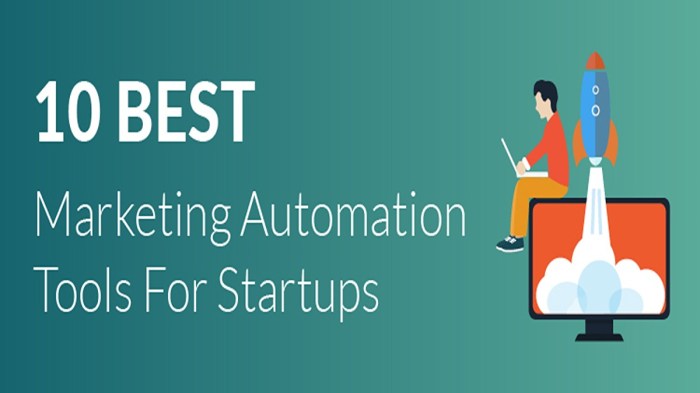Unlocking Growth: The Power of Startup Marketing Automation
Diving into the realm of startup marketing automation, this introduction sets the stage for a compelling exploration of how automation can revolutionize the way startups accelerate their growth. From streamlining processes to enhancing efficiency, the potential of marketing automation is vast and transformative.
Exploring the essential components and strategies of startup marketing automation, this overview delves into the key elements that drive success in this dynamic field.
Importance of Startup Marketing Automation

Startup marketing automation plays a crucial role in accelerating growth by helping companies streamline their processes, reach their target audience more effectively, and ultimately drive revenue. By automating repetitive tasks and implementing personalized marketing strategies, startups can maximize their resources and focus on scaling their business.
Examples of Successful Startups
- One notable example of a startup that effectively utilized marketing automation is Airbnb. By leveraging automation tools to personalize their emails, target specific customer segments, and optimize their advertising campaigns, Airbnb was able to rapidly expand its user base and increase bookings.
- Another successful startup that benefited from marketing automation is Slack. Through automated lead nurturing campaigns, targeted messaging, and data-driven decision-making, Slack was able to attract and retain customers at a rapid pace, becoming a dominant player in the communication and collaboration space.
Streamlining Processes and Improving Efficiency
Marketing automation can streamline processes and improve efficiency for startups by automating repetitive tasks such as email marketing, lead scoring, and social media management. By implementing automated workflows, startups can save time, reduce human error, and ensure consistent messaging across all channels.
This not only frees up valuable resources but also allows startups to focus on innovation and growth.
Key Elements of Startup Marketing Automation

Startup marketing automation involves several key elements that are crucial for a successful strategy. These elements include email marketing, social media automation, lead nurturing, data analytics, and segmentation.
Email Marketing
Email marketing is a fundamental component of startup marketing automation. It allows startups to reach their target audience directly through personalized and targeted messages. By automating email campaigns, startups can engage with leads, nurture relationships, and drive conversions effectively.
Social Media Automation
Social media automation is another essential element of startup marketing automation. It enables startups to schedule posts, monitor engagement, and analyze performance across various social media platforms. By automating social media tasks, startups can maintain a consistent online presence and engage with their audience efficiently.
Lead Nurturing
Lead nurturing is critical for startups to build relationships with potential customers and guide them through the sales funnel. Through automation, startups can deliver relevant content, personalized messages, and timely follow-ups to nurture leads and move them closer to making a purchase decision.
Data Analytics and Segmentation
Data analytics and segmentation are key aspects of marketing automation for startups. By analyzing data and segmenting their audience based on behavior, preferences, and demographics, startups can create targeted campaigns that resonate with their customers. This allows startups to optimize their marketing efforts, improve ROI, and drive business growth.
Implementing Marketing Automation Tools for Startups
Marketing automation tools play a crucial role in helping startups streamline their marketing efforts, improve efficiency, and drive growth. Choosing the right automation tools and effectively implementing them can significantly impact the success of a startup's marketing campaigns.
Comparing Marketing Automation Tools for Startups
- HubSpot: Known for its user-friendly interface and comprehensive features, HubSpot offers a wide range of tools for email marketing, social media management, lead generation, and analytics.
- Mailchimp: Ideal for startups on a budget, Mailchimp provides basic automation features for email marketing campaigns, audience segmentation, and reporting.
- Pardot: A Salesforce product, Pardot is a robust automation platform that integrates seamlessly with CRM systems, offering advanced lead nurturing, scoring, and tracking capabilities.
Choosing the Right Automation Tools for Startups
When selecting marketing automation tools for your startup, consider the following steps:
- Assess your specific marketing needs and goals to determine which features are essential for your business.
- Research different automation tools, compare pricing, features, and user reviews to find the best fit for your startup.
- Request demos or trials of the shortlisted tools to test their functionality and usability before making a final decision.
- Consult with your team and stakeholders to ensure alignment on the chosen automation tool and its implementation strategy.
Integration Process and Challenges of Implementing Marketing Automation Tools
Integrating marketing automation tools into your startup's existing systems can be a complex process. Some common challenges include:
- Lack of technical expertise: Startups may face difficulties in setting up and configuring automation tools without the necessary technical skills.
- Data migration issues: Transferring existing data to the new automation platform can lead to data inconsistencies and errors if not done correctly.
- User adoption: Ensuring that your team is trained and onboarded effectively to use the new automation tools is crucial for successful implementation.
Measuring Success and ROI in Startup Marketing Automation
Measuring the success and return on investment (ROI) of marketing automation efforts is crucial for startups to understand the impact of their campaigns and make informed decisions for future strategies.
Key Performance Indicators (KPIs) for Startups
Startups should track specific key performance indicators (KPIs) to measure the effectiveness of their marketing automation efforts. Some important KPIs include:
- Conversion Rate: Measure the percentage of leads that convert into customers through automated campaigns.
- Customer Acquisition Cost (CAC): Calculate the cost of acquiring a new customer through marketing automation.
- Customer Lifetime Value (CLV): Determine the value a customer brings to the business over their lifetime.
- Email Open and Click-through Rates: Monitor the engagement levels of email campaigns to assess their effectiveness.
Calculating ROI of Marketing Automation Campaigns
Startups can calculate the return on investment (ROI) of their marketing automation campaigns by comparing the revenue generated from automated marketing efforts to the overall costs incurred. The formula for calculating ROI is:
ROI = (Revenue Generated
Cost of Campaign) / Cost of Campaign
Optimizing Marketing Automation Strategies
Optimizing marketing automation strategies based on performance metrics is essential for startups to maximize their ROI. Some best practices include:
- Regularly review and analyze KPIs to identify areas for improvement.
- Segment your audience based on behavior and preferences to deliver targeted campaigns.
- A/B test different elements of your campaigns to optimize for better results.
- Use marketing automation tools to personalize communication and enhance customer experience.
Concluding Remarks
In conclusion, startup marketing automation offers a powerful toolkit for startups to navigate the competitive landscape and achieve sustainable growth. By harnessing the right tools, strategies, and metrics, startups can unlock their full potential and thrive in today's digital age.
FAQ Compilation
How can startup marketing automation benefit my business?
Startup marketing automation can significantly accelerate growth by streamlining processes, improving efficiency, and enhancing customer engagement.
What are some popular marketing automation tools for startups?
Popular marketing automation tools for startups include Mailchimp, HubSpot, ActiveCampaign, and Marketo.
How can startups measure the success of their marketing automation efforts?
Startups can track key performance indicators (KPIs) such as conversion rates, lead generation, and customer retention to gauge the effectiveness of their marketing automation campaigns.




